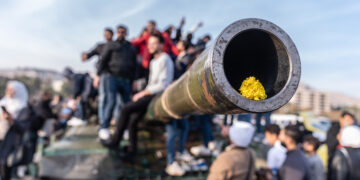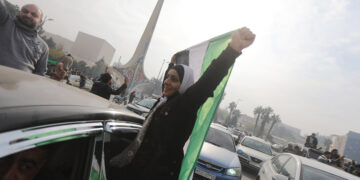Palestinians in the occupied Palestinian territory (OPT) face severe violations of international humanitarian law by Israel, and violations of their human rights by Israel, the Palestinian Authority and Hamas, the latter two which exercise certain authorities in the West Bank and Gaza, respectively. Palestinians and other minority groups in Israel also face a host of human rights abuses inside Israel.
IHuman rights organizations, UN experts, and others also have concluded based on their investigations, that Israel is committing the crimes of apartheid and persecution against the Palestinian people under its sovereignty in Israel and the OPT.
Israeli governance is characterized by the application of different sets of laws, rights and unique discriminatory policies against different populations over which it exercises sovereignty based on a combination of nationality, ethnicity, religion, citizenship, as well as current and historical geographic presence and residency. These laws and policies overwhelmingly target and discriminate against Palestinians and Palestinian citizens of Israel. While Israel provides relatively robust democratic governance and equal rights for its Jewish citizens both in Israel and in illegal settlements in the OPT, it rules by discriminatory and exclusionary laws against its Palestinian citizens, and by military rule against non-citizen Palestinians in the OPT. As such, Israel is a partial democracy for its Jewish citizens, but an apartheid military government for Palestinians under its control.
Administratively, the territories in Israel-Palestine are divided into largely distinct but often overlapping units. While the State of Israel is the power exercising ultimate control over the entirety of the area in Israel and the occupied Palestinian territory, different geographic units and classes of residency and citizenship experience many of the same, but also distinct violations of human rights and international humanitarian laws, perpetrated by a number of state and quasi-state actors.
The Occupied West Bank, including East Jerusalem
Governance and Overview
The West Bank, the area under Jordanian control until Israel occupied it on June 6, 1967, is governed under three legal systems representing three regimes. As the occupying force, the Israeli army (the Israel Defense Forces, a.k.a. the IDF) is the acting sovereign in the West Bank and exercises ultimate control of the territory—internally as well as over its borders.
The State of Palestine has been recognized by 138 states and the General Assembly of the United Nations. It does not, however, possess some of the most basic powers of a sovereign, namely control over its territory. The Palestinian Authority (PA), or the government of the State of Palestine, has limited legislative powers and authority over civilian law enforcement matters and performs many civilian administrative functions in major Palestinian cities in the West Bank. The Israeli military systemically impedes or overrides the PA's authorities, however, conducting raids into cities supposedly under PA control, as well as controlling everything from the population registry to telecommunication licenses.
In areas of the West Bank over which the PA exercises neither security nor administrative powers, referred to as "Area C" pursuant to the 1995 Oslo II agreements, the Israeli army exercises full administrative and security control over those areas. Palestinians living in Area C are subject to Israeli military law, while Israeli civilians living or present in the same territory, where most Israeli settlements are located, are subject to Israeli civil criminal law. Furthermore, the Israeli military has copied into military orders most aspects of Israeli civil and administrative law that it applies exclusively in Israeli settlements.
East Jerusalem, a portion of the West Bank that Israel formally—and unlawfully—annexed in 1980, is governed by Israel under Israeli civil law although the vast majority of its residents, Palestinians, do not have Israeli citizenship. Israeli civilian security and law enforcement agencies exercise control over the majority of East Jerusalem, although since Israel built its separation wall, several large areas that were excluded by it, are served neither by Israeli municipal authorities nor Israeli civilian police. Most countries do not recognize Israel's annexation of East Jerusalem and treat it as part of the same territorial unit as the West Bank.
Human rights violations
For Palestinians in the occupied West Bank, Israel severely restricts, often arbitrarily and at the whims of Israeli military officials, some of the most basic rights guaranteed in the International Covenant on Civil and Political Rights, to which Israel is a state party. These include: the right to life; the right to liberty and security of person; the prohibition on arbitrary arrest and detention; the right to due process and trial without undue delay; the rights to freedom of movement and to choose one's place of residence; the prohibition on torture and cruel, inhuman or degrading treatment; the right to freely leave and enter one's country; the right to equality before the law; the prohibition on compelling confessions of guilt; the prohibition on arbitrary interference with privacy, family, home and correspondence; the right to freedom of expression; the right of peaceful assembly; the right to freedom of association; the right to found a family; basic democratic rights, including the right to vote and be elected; the right to equality before the law; the right to nationality; the right to dispose of their natural resources; and the right to self-determination.
Palestinians in the occupied West Bank also face a host of human rights violations from the Palestinian Authority. These include: the right to life; the right to liberty and security of person; the prohibition on arbitrary arrest and detention; the right to due process and trial without undue delay; the prohibition on torture and cruel, inhuman or degrading treatment; the right to freely leave and enter one's country; the prohibition on arbitrary interference with privacy, family, home and correspondence; the right to freedom of expression; the right of peaceful assembly; the right to freedom of association; and the right to vote and be elected.
Palestinians in occupied East Jerusalem enjoy more rights and freedoms than Palestinians living in PA-controlled areas and those living under direct Israeli military rule in Areas B and C of the West Bank, but still face a slew of human rights violations at the hands of Israeli authorities. These include: the right to life; the right to liberty and security of person; the prohibition on arbitrary arrest and detention; the right to due process and trial without undue delay; the rights to freedom of movement and to choose one's place of residence; the prohibition on torture and cruel, inhuman or degrading treatment; the right to freely leave and enter one's country; the right to equality before the law; the prohibition on arbitrary interference with privacy, family, home and correspondence; the right to freedom of expression; the right of peaceful assembly; the right to freedom of association; the right to found a family; basic democratic rights, including the right to vote and be elected; the right to equality before the law; the prohibition on compelling confessions of guilt; the right to pursue social and cultural development; the right to nationality; and the right to self-determination.
Israeli authorities also regularly violate, albeit at a scale and frequency incomparable to the treatment of Palestinians, the human rights of small numbers of Israeli citizens present or living in the West Bank. These include: the right to liberty and security of person; the prohibition on arbitrary arrest and detention; the right to freedom of movement; the prohibition on torture and cruel, inhuman or degrading treatment; the prohibition on arbitrary interference with privacy, family, home and correspondence; the right to freedom of expression; the right of peaceful assembly.
In addition to human rights violations committed by Israeli and PA official bodies and officials, Israeli and Palestinian civilians in the occupied West Bank, including East Jerusalem, also face human rights violations at the hands of vigilantes, militants, civilian security contractors, and other non-state actors on both sides committing acts of organized as well as spontaneous violence. These include: the right to life; the right to liberty and security of person; and the prohibition on torture and cruel, inhuman or degrading treatment.
International Humanitarian Law
In addition to Israeli actions and policies that violate the human rights of Palestinians, because Israel militarily occupies the Palestinian territories, it also has obligations under international humanitarian law (IHL). Israel's violations of IHL, most of which are derived from the Fourth Geneva and Hague Conventions, range from the destruction of private property to the acquisition of territory by force and unlawful annexation.
Under the Fourth Geneva Convention, Palestinian civilians are granted certain rights as "protected persons." The occupying power is prohibited from taking certain actions against protected persons, including: forcible displacement within the occupied territory as well as forcible transfer and deportation out of the territory; exacting collective punishment; torture or other violence against civilians; transferring prisoners outside of the occupied territory, including into the territory of the occupying power. Israel regularly violates all of the above and more.
IHL also includes provisions and prohibitions intended to prevent the occupying power from making permanent changes to the occupied territory. These include: the prohibition on transferring civilians into the occupied territory, which can change its demographic makeup; pillage and plundering of natural resources; making changes to the legal system, and more. Israel has done all of the above, and more.
Additionally, IHL, also known as the laws of war, regulates military activity and other hostilities. Israel has been accused of a number of violations of this area of IHL, particularly in its military campaigns against Palestinian militant groups in the Gaza Strip, although also in the West Bank. Most of these violations and war crimes stem from the principles of proportionality and the distinction of civilian and humanitarian targets.
The Gaza Strip
Governance and Overview
The Gaza Strip, the area controlled by Egypt until June 6, 1967, is governed internally by Hamas, a Palestinian political party and militant group which itself seized control from the Palestinian Authority in 2007, one year after Israel withdrew its troops and several thousand settlers and handed over internal control to the PA.
The Israeli military still maintains control over the population registry, coastal waters, airspace, electromagnetic frequencies, enforces a no-man's land inside Gazan territory along the fence separating it from Israel, and together with Egypt, controls the entry and exit of all goods and persons. The IDF also controls all movement of goods and persons between the West Bank and Gaza Strip, including deciding whether individual patients can seek life-saving medical care in a different part of Palestine. Due to the breadth and severity of those controls, commonly referred to as a siege, Israel is still considered to be the occupying power. As a result, Israel continues to be, and have the responsibilities of, the occupying power over Gaza under international law.
Israel's 15-year siege, combined with devastating military campaigns every few years, has left the Gaza Strip impoverished, underdeveloped, as part of a policy to keep the Palestinian civilian population on the brink of humanitarian and environmental disaster. Today, over 60 percent of households require food assistance, according to the UN, and general unemployment stands at nearly 50 percent. The siege of Gaza is an unlawful act of collective punishment against the Palestinian people.
Human rights violations
Israeli authorities, although not physically present in the Gaza Strip, systematically and individually violate basic human rights of Palestinians living in the coastal territory. These violations, guaranteed by international treaties to which Israel is a state party, primarily the International Covenant on Civil and Political Rights, include: the right to life; the prohibition on cruel, inhuman or degrading treatment; the right to liberty and security of person; the prohibition on arbitrary arrest or detention; the right to due process and a timely trial; the right to freely leave and enter one's own country; the right to free movement, including the right to choose one's place of residence; the prohibition on arbitrary interference with one's privacy, family, home, or correspondence; the right to freedom of expression; the right of peaceful assembly; the right to freedom of association; the right to marry and found a family; the right to acquire a nationality; the right to vote and be elected; and the right to self-determination.
Hamas, the de facto governing authority in the Gaza Strip, regularly violates Palestinians' basic human rights guaranteed by the International Covenant on Civil and Political Rights, to which Palestine is a state party. These violations include: the right to life; the prohibition on torture or cruel, inhuman or degrading treatment or punishment; the prohibition on arbitrary arrest or detention; the prohibition on imprisonment for failure to pay a debt; the right to freedom of expression; the right to peaceful assembly; the right to freedom of association; basic democratic rights, including the right to vote and be elected; and the right to equality before the law.
Hamas and other militant groups in the Gaza Strip are also responsible for violating basic human rights of Israeli and other civilians inside Israel, primarily manifested as indiscriminate attacks with crude projectile weapons which violate the right to life.
Israel
Governance and Overview
Israel, the area Israel controlled prior to June 6, 1967, is governed by the civilian government of the State of Israel under laws legislated by an elected parliament. For the most part, civilian agencies are charged with maintaining security and law enforcement within this territory. Because Israel has maintained an official state of emergency since 1948, however, its Defense Ministry and military retain many authorities within Israel, including the authority to order the indefinitely administrative detention of any civilian. From 1948 until 1966, Israel maintained a system of military governments over its Palestinian citizens while its Jewish citizens lived under civilian rule. The Golan Heights, sovereign Syrian territory that Israel occupied in June 1967 and unlawfully annexed in 1981, is governed by Israel under civil laws and institutions.
Palestinian citizens of Israel enjoy most of the same rights as Jewish-Israeli citizens, but there are significant and impactful areas of Israeli law and policy that distinguish and discriminate against them. A number of Palestinian political and religious leaders in Israel have faced persecution, Palestinian citizens face unique restrictions on family unification procedures, are excluded from certain categories of land acquisition and ownership, in many cases are denied basic services such as running water and electricity, face systematic discrimination in matters of planning, face discrimination from police and also suffer from under-policing, and more. Embodying that intrinsic discrimination and serving as its legal basis, is a quasi-constitutional law that declares Israel to be the nation-state only of Jews, including non-citizens. Israel has no explicit constitutional guarantees of equality.
Human Rights Violations
Israeli authorities are responsible for a number of systemic and individual human rights violations, in contradiction to its obligations as a state party to the International Covenant on Civil and Political Rights. These violations primarily affect Palestinian citizens of Israel and other ethnic and religious minorities, although in limited cases also affect Jewish citizens of Israel. These violations include: the prohibition on the arbitrary deprivation of life; freely determine political status and pursue economic, social, and cultural development; the prohibition on torture or cruel, inhuman, or degrading treatment or punishment; the prohibition on arbitary arrest or detention; the right to due process; the right to dignity of imprisoned and jailed persons; the right to freely leave one's country; the prohibition on compelling confessions of guilt; the prohibition on arbitrary interference with one's privacy, family, home, or correspondence; the right to freedom of expression; the right of peaceful assembly; the right to freedom of association; the right to found a family; and the right to equality before the law.
Around the World
In addition to Israel's human rights violations in the territory it directly controls, it also contributes to human rights violations and supports undemocratic regimes across the world. This support includes sales of weapons, spyware and other surveillance technology and training of foreign militaries and forces. Israeli spyware is regularly sold to autocratic and oppressive regimes, which use the technology to persecute, harass, and target journalists, human rights defenders, and political opponents. Israel is also a nuclear power – the only one in the Middle East – and the only country not subjected to International Atomic Energy Agency (IAEA) inspections.
The United States has been Israel's main supporter in the international community since 1948, including with bilateral financial assistance, military aid now amounting to over $4 billion each year, and using its veto power at the UN Security Council against resolutions that could impose penalties on Israel for human rights violations and its extended occupation. Since the signing of the Oslo Accords, each American administration has remained committed to a negotiated two-state solution as the only possible outcome, even as Israel progresses with making new 'facts on the ground' to prevent that outcome. The United States has also effectively blocked other stakeholders, including European countries, from taking initiative to rehabilitate a peace process.





































